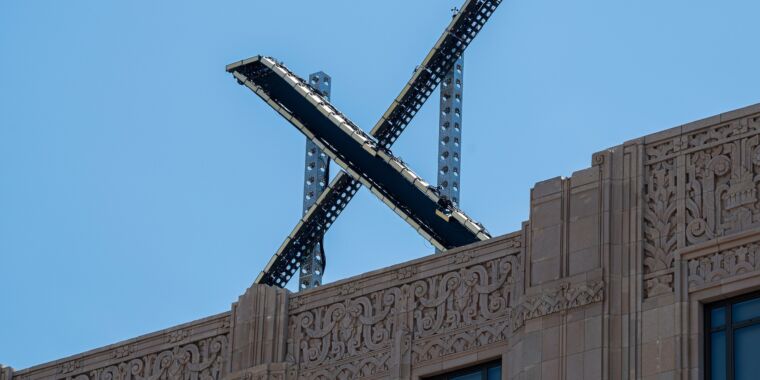Getty Images | Bloomberg
A federal judge yesterday granted Elon Musk’s motion to dismiss a class-action complaint alleging that laid-off Twitter employees were wrongfully denied the severance they were entitled to under the Employee Retirement Income Security Act (ERISA).
The employees may be able to latch onto another lawsuit against Twitter that alleges different severance-related violations, but their claim under ERISA was denied by US District Judge Trina Thompson in the Northern District of California.
“Plaintiffs are not without recourse,” Thompson wrote, noting that they may benefit from similar cases ongoing against the Musk-owned firm. “Indeed, there are other cases brought against Twitter for the failure to pay wages or provide employee severance benefits during the same or overlapping period that Plaintiffs allege Defendants denied them and the putative class sufficient severance benefits under the severance plan at issue here.”
The putative class action that was denied yesterday was filed last year by former Twitter employees Courtney McMillian and Ronald Cooper, who were offered one month of severance pay. They claim that the “severance Twitter has offered to date is a fraction of what employees are entitled to as Plan participants,” and they wanted to represent a class defined as all participants in the severance plan who were terminated from Twitter after Musk bought the company in October 2022. They alleged that “terminated employees remain entitled to no less than $500 million.”
Twitter, now X Corp., claimed that the company did not maintain a severance plan governed by ERISA. Plaintiffs claimed that for several years before the Musk takeover, there was a “formalized policy” and pointed to “documents that provide a uniform and detailed policy framework for the numerous post-termination benefits Twitter provided to employees.” Plaintiffs said employees were promised severance based on the reason of departure, length of tenure, job level, department, issuance of stock units, and other factors.
No discretion
To be governed by ERISA, a severance plan must be an “ongoing administrative program for processing claims and paying benefits.” The Twitter plan doesn’t qualify, Thompson wrote in an order granting Musk’s motion to dismiss.
A severance plan with a single lump sum payment can be governed by ERISA under certain conditions, Thompson wrote. Under a precedent cited by plaintiffs, a severance plan can be covered by ERISA if lump-sum payments are based on a discretionary analysis performed on a case-by-case basis.
“Here, by contrast, Twitter paid and offered to pay severance payments based on basic employment criteria that involved mathematical calculations, which does not involve a ‘case-by-case’ analysis or ‘discretionary application’ of the Twitter severance benefits’ terms,” Thompson wrote. “Twitter’s payments were ‘fixed, due at known times, and [did] not depend on contingencies outside the employee’s control.'”
Thompson found that the relevant severance plan is the one applied after the Musk takeover. She wrote that “the operative complaint’s facts do not show that there was any discretion required in determining which employees were eligible because all employees qualified for the severance plan upon termination due to the acquisition and subsequent merger.”
There was also no discretion in bonuses for laid-off employees “because there was a formula for calculating severance payments that staff could apply before issuing payment.” Thompson dismissed the ERISA claims and said that any attempt to amend those claims “would be futile.”
Other severance lawsuits still alive
Plaintiffs can file an amended complaint but only for non-ERISA claims, such as breach of contract or promissory estoppel. An amended complaint may “state claims based on the deficient severance benefits offered or provided to terminated employees pursuant to the severance plan that applied due to the 2022 and 2023 mass layoffs,” Thompson wrote.
If plaintiffs go that route, “this Court will consider issuing an Order finding this case related to one of the cases currently pending, such as Cornet,” Thompson wrote. If the case is found to be related to Cornet, it could be transferred to the District of Delaware, where Cornet is being heard.
The Cornet v. Twitter lawsuit alleges violations of the Worker Adjustment and Retraining Notification (WARN) Act. The lawsuit says that Twitter did not give all employees the required 60 days’ advance written notice before layoffs, and that Twitter did not give payments in lieu of the notice.
Both cases concern Twitter’s allegedly “deficient severance payments following mass layoffs in November 2022, December 2022, February 2023, and September 2023,” Thompson noted.
In addition to alleged WARN Act violations, the Cornet suit claims that Twitter violated promises made during the months before Musk completed the acquisition. As Thompson wrote, the “Cornet plaintiffs assert contract-based claims for severance benefits on behalf of a nationwide putative class of X Corp employees and former employees that had been promised that ‘if there were layoffs, employees would receive benefits and severance at least as favorable as the benefits and severance that Twitter previously provided to employees.'”
In September 2023, Musk’s X Corp. agreed to settlement talks on arbitration claims from about 2,000 employees laid off after the sale. However, the talks didn’t end in a deal and the severance lawsuits continue.



)






